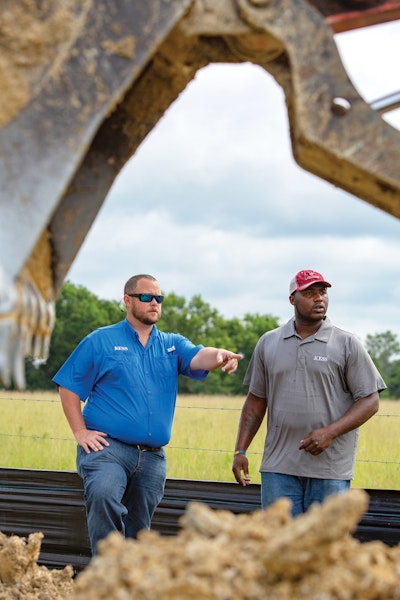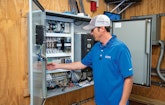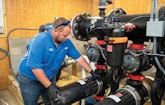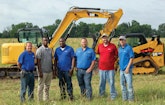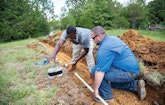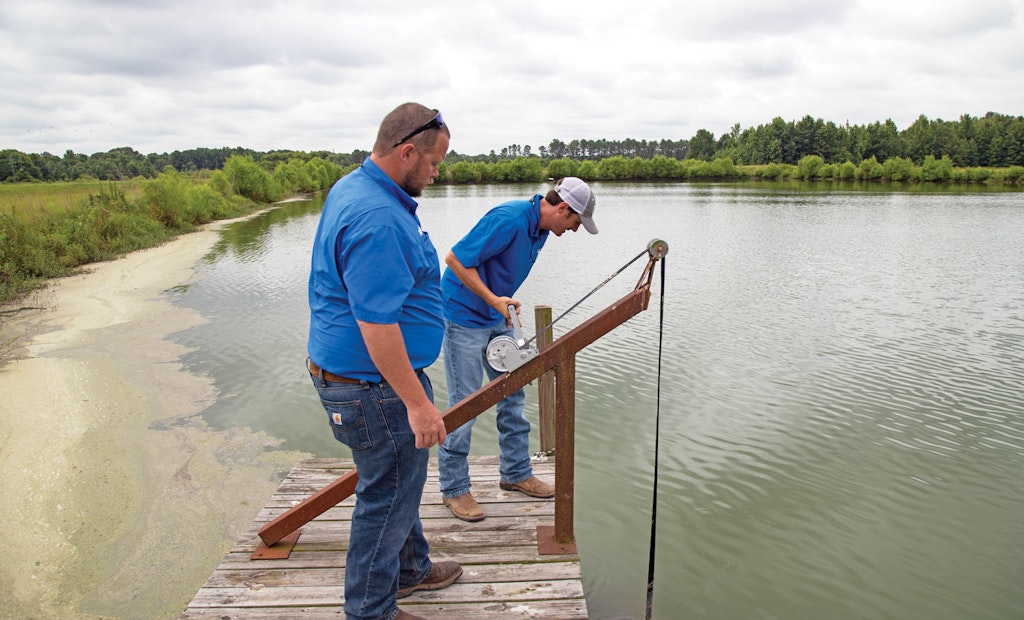
David Mastin, left, and Shane Duncan prepare to inspect a screen in one of the company’s large-flow lagoons that are part of a cluster system in Pike Road, Alabama.
Interested in Systems/ATUs?
Get Systems/ATUs articles, news and videos right in your inbox! Sign up now.
Systems/ATUs + Get AlertsThe soil may not be good in central Alabama, but for KESS Environmental Services of Opelika, business is well-rooted and growing. This 15-person company focusing almost exclusively on installations has created a space where concern for customers, employees and the community at large has led to a growing demand for its services.
KESS covers the state if needed, but only a few times a year will crews go beyond the nine counties surrounding the state capital of Montgomery, says Shane Duncan, owner. The company does have one crew outside that core area. It’s based about 100 miles away near Birmingham. KESS technicians also go into the city of Montgomery because the municipal sewer doesn’t reach everywhere, and many properties depend on onsite systems.
Installations consist largely of ATUs from Clearstream Wastewater Systems based in Lumberton, Texas. To complete the system they usually add subsurface dripline.
“We’re in the Black Belt,” says David Mastin, company manager. “It’s sometimes called prairie mud. It is dirt that does not perc — period.”
The name Black Belt comes originally from the soil present when the land was first cultivated. The soil was rich and black, and it led to the establishment of plantations. By the middle of the 20th century, the good black soil was gone because of poor farming techniques.
Dripline goes in 6 to 8 inches below grade and is typically zoned into sections for dosing. The saying in Alabama is that anything deeper than 4 inches is below the frost line.
MOSTLY INSTALLS
Installations are 80 percent of the work at KESS. Another 10 percent is pumping, and the remaining 10 percent is everything else the company does such as managing a community wastewater system in a subdivision of about 700 homes.
In that subdivision, every home has its own 1,500-gallon tank. Wastewater flowing out of a tank is filtered before flowing to a lift station that serves a group of homes. The station pumps water to a 10-inch force main that ends at a wastewater treatment plant.
Maintenance of ATUs is another part of that 10 percent. Under Alabama law, all advanced systems must have a maintenance contract for the first two years after installation. KESS technicians will blow out clogged lines, clean filters, check air compressors, and do everything else the manufacturer recommends. After that, homeowners are free to do what they wish with their systems, but most of them keep their contract with KESS, Mastin says.
“By doing so, it prolongs the life of the system. People don’t understand they have to clean those filters that started being required in 2006,” he says.
Marketing is not a major emphasis for the company. They are starting to use Facebook more often, Duncan says. “But to be honest, we don’t advertise a whole lot. The company has been around a long time, and everybody knows the name,” he says.
Mastin says he started working to increase Facebook exposure, but the company picked up so much work that he hasn’t pushed hard on it. “It’s because of a single principle: You take care of people, and they’ll take care of you,” he says.
Duncan and Mastin are trying to expand the pumping division, management of private systems, and repairs. They are planning for a new vacuum truck, larger than the one they have and with capacity to handle bigger jobs, and they would like to make pumping available 24/7 because they see a niche to fill. All the pumpers in their area are overwhelmed with work, Mastin says, and because many are one-person operations, they have a limited ability to offer service after hours or on weekends.
HELPING HAND
Sometimes technicians will travel across the state to do work for no money. It’s part of the company’s ethics, Mastin says. “Any profession ought to give back a little bit. We’re big and give more,” he says.
They do this under the TRAC (Technical Review and Advisory Committee) program of the Alabama Onsite Wastewater Association, which Mastin serves on. TRAC arranges for low-income homeowners to receive new onsite systems at no cost to them. Manufacturers donate material, installers donate their time and the work gets done. KESS handles three to five of these jobs each year.
There is a benefit to the company in terms of knowledge. If, for example, Infiltrator Water Technologies donated the tank and chambers, a factory representative is usually on hand for the project, Mastin says. Then the installation becomes a training opportunity for technicians who can learn tips and tricks directly from the equipment manufacturer.
“I’m real big on education. I love it when these reps come out. They know a lot more than we do about how their product works and how we can work with it,” Mastin says.
EQUIPMENT LIST
A busy company like this keeps a lot of gear on the road. KESS uses:
- Two Cat excavators, a 2014 308 and a 2014 305.5
- 2011 Kubota excavator
- 2009 Wacker Neuson 8003 excavator
- 2016 Cat 259D skid-steer
- Kubota SVL 90 skid-steer
- 2014 Kubota farm tractor with an end loader, brush hog and other accessories
- 1996 Mack vacuum truck with a 2,500-gallon steel tank and a Wittig pump (Gardner Denver)
- A variety of Dodge, Ford and GMC pickups and service trucks
“We have a bunch of trailers,” Duncan says. “Every piece of equipment has its own trailer so you don’t have to go back and forth.”
They also have a parts trailer with pipe racks and other racks on it. Three trucks have fuel cells to refill machinery on site. Fuel tank capacities range from 50 to 80 gallons.
Aside from a larger tank, a new vacuum truck will be equipped with a jetter. That will help technicians maintain lift stations more easily and will avoid the need to hire someone else to bring a jetter to a job, Mastin says.
TREAT WORKERS RIGHT
After one year with KESS, employees receive a week’s vacation and one week of sick time. That doesn’t mean technicians work the rest of the time.
“This company is like a family,” Duncan says. “We encourage our guys not to miss events their kids have. Yesterday was graduation, so a few of our people went to watch their kids. They give us a lot of hard work every day and make this company go, so they deserve that time.”
Employees also receive a few days of paid time off at Thanksgiving and Christmas.
“They also know that if they do their jobs and work hard, I’ll give them the rest of a day with pay if they need it,” Duncan says.
“We also have a rule we try to follow: If we hire you, it’s going to be a lifetime hire,” Mastin says. Workers may leave, but it will be their choice, and KESS works to keep its crew lean so there are no layoffs.
They don’t offer health insurance or help with it — yet. It’s something they would like to do for their workers, Duncan says.
On the workers’ side there are also expectations and responsibilities. Part of their raises depends on improving themselves.
“We encourage you to get your septic installation license,” Mastin says. “When you start wanting to take over a crew, we offer you a slot at the school if you want to take it. With that slot, we pay for your school, we pay for your hotel, we pay for your testing, we pay for everything. And then on top of that, you’ll get a raise because in our minds that means you’ve taken the step: You want to better yourself.”
Every year they take as many workers as possible to a regional trade show, even the unlicensed workers, so they can meet vendors and see products.
Crew leaders get a truck to drive, and they’re required to earn their CDLs so they can tow machinery, Duncan says.
Employees also receive raises for hard work and bonuses from big jobs.
All of that means no turnover. KESS has hired several technicians in 2018, but it’s because the amount of work is increasing.
In addition to Mastin and Duncan, the company depends on three crew leaders. The two primary leaders in Montgomery are Sears Smith and Greg Foley. Smith is the senior leader and watches everything. Foley oversees the technical side and troubleshooting. He’s the guy to call when there are lift station problems, Duncan says. Dylan Green is the senior leader who works with the northern crew in St. Clair County near Birmingham where he handles utility management and installations.
Duncan and Mastin also depend on these three leaders to train people as they work on jobs. Safety training is emphasized almost every day and formally in monthly talks about safety issues.
LIVE TO SERVE
Service defines KESS, whether it’s service to employees or customers, or even to people who don’t live in the area. That’s one reason why Duncan and Mastin support the TRAC program — because there are consequences for everyone.
“At the end of the day, this is where my kids are playing, in the streams and rivers. I don’t know which family doesn’t like going to the beach, and I hate to say it, but we’re north of the beach and that’s where our water ends up,” Mastin says.
Both he and Duncan fish, hunt (ducks, deer and the occasional alligator) and do other outdoor recreation. “So we’re huge on taking care of our resources because they’re going to take care of us,” Mastin says.
“It’s not about the competition. It’s about doing the right thing for the customers and the environment. It’s about taking care of the people,” Duncan says.
Mastin and Duncan are not only successful, but unwilling to keep success to themselves, and that is good for everyone involved — for themselves, their employees, the industry and their community.
A powerful mentor
When his father died, David Mastin gave up his 13-year career as a deputy sheriff and stepped into his father’s pumping company to help his mother. He found his own help in the person of Danny Brown, a retired U.S. Navy officer and founder of KESS Environmental Services.
“Danny Brown took me under his wing. When I started installing, Mr. Brown came to me, gave me keys to his equipment and said he would help in any way possible. He invited me to all his job sites. He’s real big on education and teaching people. My workers would be working, but I’d get in his truck and we’d go to one of his jobs. He would say, ‘Do you understand why this dirt is no good?’ It blew my mind that my competitor is teaching me everything,” he says.
The same was true for Shane Duncan. He had a homebuilding company and met Brown when KESS installed onsite systems in the subdivisions he worked on.
“Danny’s whole outlook in life is he wants to help others succeed,” Duncan says.
One day Duncan jokingly told Brown that he would buy KESS. A few years later, that came to pass when Brown decided to sell. Mastin is now the general manager of KESS, and his A-Z Pumping Services handles pumping for the company.
“I think he foresaw the future for two younger guys to work together. He sort of put us together with lunches and things,” Duncan says. “He takes care of us and makes sure we’re doing the right thing.”
They learned by Brown’s example.
“I invite every installer to our job sites,” Mastin says. “We sell Clearstream Wastewater systems but encourage them to come and see how the work is done. We also invite health department inspectors to come out and get their hands in the dirt and learn. We’re trying to continue what Mr. Brown started.”
